Four young women share what they learned or inherited from their mothers and grandmothers.
KRISHNA PATEL
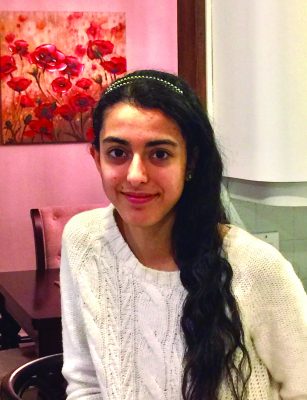
A Horace Greeley High School junior, Krishna Patel realizes that she has a very different reality than her grandmother’s experience at 16-years-old. “My life consists of scurrying from one extracurricular to the next, staying up late to get my homework done, and spending the weekends with my friends. My grandmother dropped out of 10th grade to get married and start a family of her own, as was common in the 1950s in rural India.
I will never forget when she presented me with two thick silver anklets. I was 14 and she was visiting from San Francisco. She called me into the kitchen of our house in Millwood. She said she had something for me. “The same ones I wore on my wedding day, 60 years ago,” she said.
“I wasn’t much older than you.”
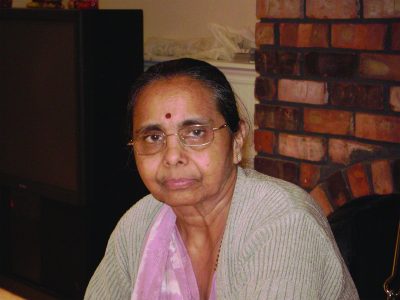
Krishna appreciates how her grandmother found the courage to break from tradition to become a strong, outgoing, powerful woman, and set the precedent for the other women in the family to do the same. “When my grandfather, a prominent Assemblyman, was imprisoned due to his political views, my grandmother continued to be an activist for reform, against his wishes due to concerns for her safety. My grandmother was very brave when, at 40, she had the chance to join her brother in the United States.
She taught herself English and took up a job at a perfume factory to finance a new life here.”
MADDY CHEN
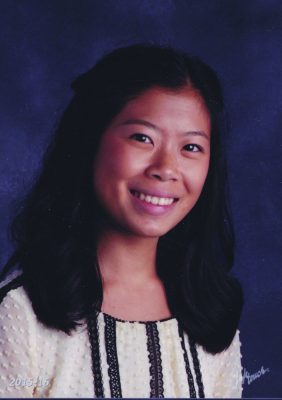
Similar to Krishna’s grandmother, Maddy Chen’s grandmother also had little to say about her marriage. Both her grandmother and her grandmother’s identical twin sister, who was born first in 1938, had arranged marriages in Hainan, China. The firstborn was promised to a village boy who became a rice farmer. Maddy’s grandmother, was also betrothed in 1940 to a village boy, but he later immigrated to America and became a doctor. “This two minute difference between my grandmother and her twin has extended across the generations.” Maddy, a senior at Centennial High School in Maryland, reflects.
“My grandmother’s twin had a son who became the local village butcher. Every day, he wakes up at 4 a.m. to slaughter a pig. He spends the rest of his day selling pieces of meat in a hot, crowded, smelly, open air market. My mother is a dermatologist who uses her hands only to perform delicate skin surgeries. I often ponder what would have happened to my grandmother, my mother, and me if the second born twin married the rice farmer.”
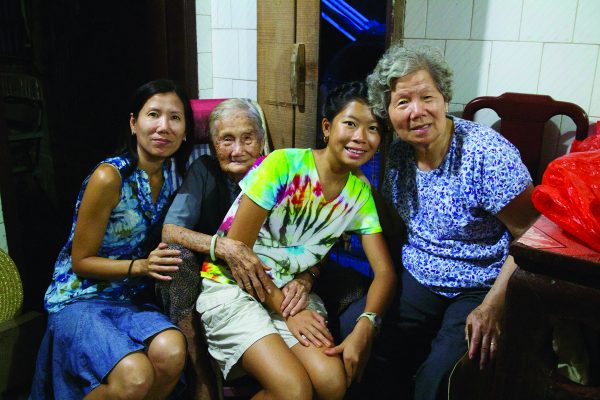
HANNAH FENLON
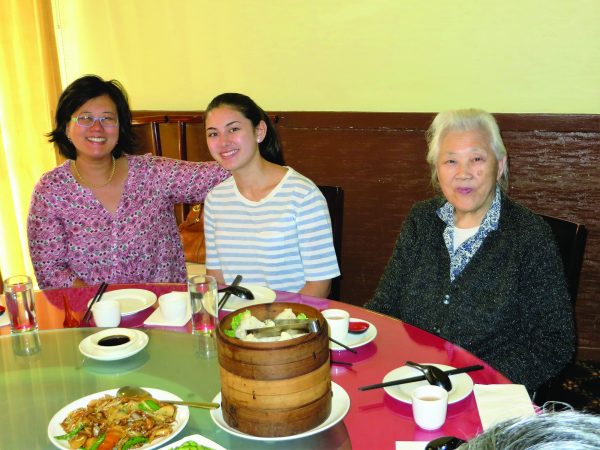
It is possible be both the same and wildly different from the women in one’s family. In Hannah Fenlon’s family, Hannah learned cultural traditions by cooking with her great grandmother and grandmother, just as her mother and aunts did. “Whatever the size or shape or “mistakes” my little hands made when we gathered to make dumplings, I also saw my great-grandmother’s expert, lovely hands pinching the dough just so, plopping them in boiling water and then, scooping the delicious dumplings as they floated to the top of the pot.”
Hannah, a junior at Horace Greeley High School, also inherited creative abilities and attention to detail from her grandmother and great-grandmother who were talented seamstresses. “Ever since I was a little kid, I liked arts and crafts.” says Hannah. “And I loved learning to quilt.”
ALEXIS DRAPER

Teaching yoga, sharing a laugh and traveling are among the many things that connect Alexis Draper and her mother, Susan, of Armonk. Alexis, now a freshman at Texas Christian University, recalls a special summer in Todi, a small village in the hills of Umbria, Italy.
This trip was in preparation for Alexis’s first year of Italian study at Byram Hills High School. Each morning, Alexis said, she and her mom “left their little apartment and walked down the cobble stone steps to the pastry shop in town, and then went to our classroom to learn Italian. Though we lived there for only two weeks, we progressed from just waving “hello” to having small conversations with the lady who would feed the stray cats, with the woman from our favorite boutique, and with the servers in the restaurants.”
She and her mom took the afternoons to drive to different ancient towns, exploring places like the grandiose Basilica of San Francesco in Assisi, hiking up the mountain at Cascata della Marmore (waterfalls), and riding a birdcage-like funicular to the top of Gubbio. “All the sites were spectacular, but the magic of the trip was really in Todi itself because my mom and I learned something new together every day.” On one of their last evenings in town, Alexis and her mom participated in a cooking lesson at a local woman’s home. “We stumbled a bit through our recipes in our new found language but we enjoyed the fruits of our labor, dining under the stars with other travelers from around the world.”
As Alexis, Hannah, Maddy and Krishna shared these formative experiences with me and what they learned from the women in their families, I was reminded of a trip I took in 1995 with my grandmother to Weihai, China. It was the first time I met my great grandmother and my great aunt, who had been sent to a re-education labor camp during the Cultural Revolution.
My grandmother left behind her family at age 20 when she fled Communist China with my mother and her infant son. Her life journey took her from China, to Hong Kong, then Brazil and finally the United States. When we were returning to New York, my great aunt gave us bundles of seaweed to take home. She had roamed the shores surrounding Weihai, a city on a peninsula, to collect the seaweed. She dried the pieces in the sun and then wrapped them in scraps of cloth. She didn’t have much money but arduously gathered these fragments culled from the sea of their hometown. Somehow, we made it through customs with those pungent bundles the size of pillows.
That seaweed connected three generations of women. That gift to my grandmother from her sister’s gnarled hands was my inheritance of courage, love, and hope.
